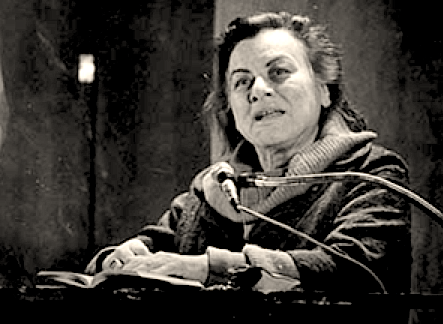Monday
Paris Review reports that Muriel Rukeyser’s “Poem” has been circulating recently, and it’s easy to understand why. As with the speaker, most mornings many of us check the newspapers that “pour out of various devices” and feel “more or less insane.” “Poem” may have been written 50 years ago but it feels as though it appeared yesterday.
Rukeyser (1913-1980) was an activist as well as a poet and cut her teeth at 18 covering the Scottsboro trial, the infamous 1931 case where several innocent black men were sentenced to death for raping white women. Throughout the subsequent years, Rukeyser wrote about many of the world’s horrors, including the Spanish American War, the Holocaust, and the Vietnamese War. Poetry Foundation notes that she has been compared to Walt Whitman for her social passion and her optimism.
“Poem” doesn’t begin optimistically, however. In the first seven lines, the poet sounds like one who has indeed lived through one of the bloodiest centuries in world history. 1968 was, of course, a particularly tempestuous year:
I lived in the first century of world wars.
Most mornings I would be more or less insane,
The newspapers would arrive with their careless stories,
The news would pour out of various devices
Interrupted by attempts to sell products to the unseen.
I would call my friends on other devices;
They would be more or less mad for similar reasons.
Rukeyser does not succumb to fatalism, however, but turns instead to poetry. She writes to those she does not see and those who have not yet been born, which already signals a certain faith in humankind and in the future. Her writing gives her reason to hope since it reminds her that, even in the most dreadful of circumstances, people have found ways to communicate with each other and to imagine better ways of living:
Slowly I would get to pen and paper,
Make my poems for others unseen and unborn.
In the day I would be reminded of those men and women,
Brave, setting up signals across vast distances,
Considering a nameless way of living, of almost unimagined values.
The next line makes paradoxical use of light and dark imagery to capture how humans have found hope even at times when no hope seemed possible:
As the lights darkened, as the lights of night brightened,
We would try to imagine them, try to find each other,
To construct peace, to make love, to reconcile
Waking with sleeping, ourselves with each other,
Ourselves with ourselves.
Note the intimate steps in Rukeyser’s plan of action. To imagine unimagined values, people must reach out to others, working to reconcile their dreams with reality and “ourselves with ourselves.”
Once we engage in such activities, we stop worrying about the practicalities of what we desire, “let[ting] go the means” and waking into new and unrealized possibilities. Once we “reach beyond ourselves,” we do not merely survive a century of world wars but live:
We would try by any means
To reach the limits of ourselves, to reach beyond ourselves,
To let go the means, to wake.
I lived in the first century of these wars.
Here’s the poem in its entirety. Turn to it when the world seems too much with you:
Poem
By Muriel Rukeyser
I lived in the first century of world wars.
Most mornings I would be more or less insane,
The newspapers would arrive with their careless stories,
The news would pour out of various devices
Interrupted by attempts to sell products to the unseen.
I would call my friends on other devices;
They would be more or less mad for similar reasons.
Slowly I would get to pen and paper,
Make my poems for others unseen and unborn.
In the day I would be reminded of those men and women,
Brave, setting up signals across vast distances,
Considering a nameless way of living, of almost unimagined values.
As the lights darkened, as the lights of night brightened,
We would try to imagine them, try to find each other,
To construct peace, to make love, to reconcile
Waking with sleeping, ourselves with each other,
Ourselves with ourselves. We would try by any means
To reach the limits of ourselves, to reach beyond ourselves,
To let go the means, to wake.
I lived in the first century of these wars.
